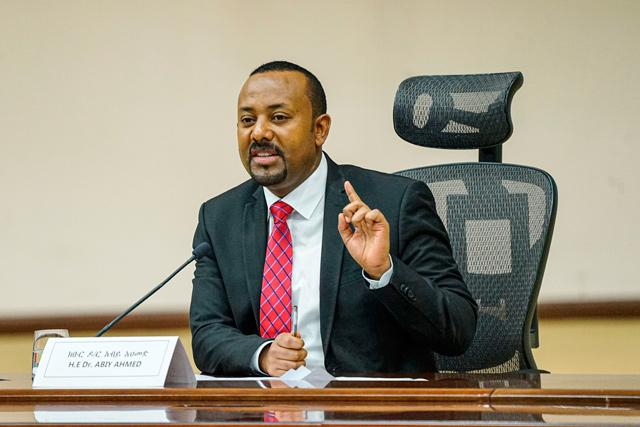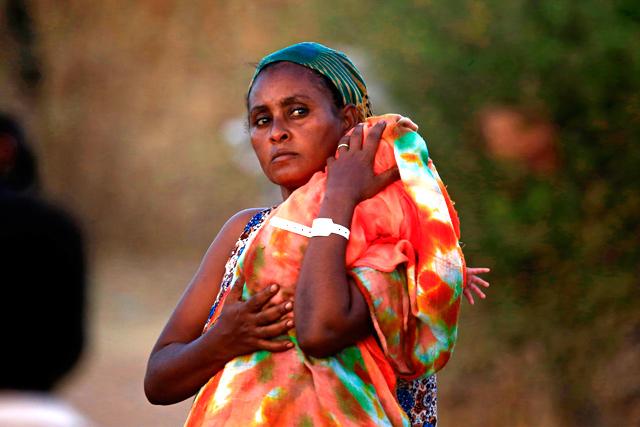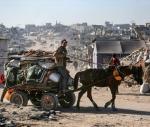You are here
Ethiopia's Abiy says has Tigray leaders in his sights
By AFP - Dec 01,2020 - Last updated at Dec 01,2020

Ethiopian Prime Minister Abiy Ahmed speaks at the House of Peoples Representatives in Addis Ababa, Ethiopia, on Monday (AFP photo)
ADDIS ABABA — Ethiopian Prime Minister Abiy Ahmed said on Monday Tigray region's dissident leaders had fled west of the regional capital after weeks of fighting, but said federal forces were monitoring them closely and would "attack" them soon.
Abiy, winner of last year's Nobel Peace Prize, this month ordered military operations against leaders of Tigray's ruling party, the Tigray People's Liberation Front (TPLF), in response to what he said were TPLF-organised attacks on Ethiopian federal army camps.
More than three weeks of fighting between federal soldiers and pro-TPLF forces has left thousands dead in the northern region, and prompted tens of thousands of refugees to flee across the border into Sudan.
"I want them to hear me: Yesterday evening, around midnight, we saw them from the situation room in the area between Hagere Selam and Abiy Addi," Abiy said in remarks to lawmakers, referring to two towns west of the Tigray capital Mekele.
"We didn't attack them at night because as they retreated they took their wives, children and abducted soldiers... But this will not continue."
The fighting has been a dramatic escalation of tensions between Abiy and the leaders of the TPLF, which dominated Ethiopian politics for nearly three decades before anti-government protests swept Abiy to office in 2018.
Abiy said on Saturday the military operations were "completed" after federal forces claimed control of the Tigray regional capital Mekele.
The TPLF leaders, however, have repeatedly vowed to fight on as long as federal forces are on Tigrayan soil.
Their exact whereabouts remain unknown.
'Mekele is ours'
As the Ethiopian military beared down on Mekele last week, global concern mounted about a possible bloodbath in a city that, before the conflict, had a population of half a million.
But the government says little combat actually occurred as pro-TPLF forces retreated.
A communications blackout in Tigray has made it difficult to verify claims from both sides about how the fighting is going.
On Monday Abiy claimed soldiers did not kill any civilians as they took over Mekele and other cities in Tigray.
“Mekele is ours, it was built with our own resources. We are not going to destroy it,” he said. “Not even a single person was harmed by the operation in Mekele.”
The International Committee of the Red Cross said on Sunday that hospitals in Mekele were flooded with trauma patients, though it did not specify how the injuries were sustained.
Abiy also dismissed claims from TPLF leader Debretsion Gebremichael that air strikes had resulted in many civilian casualties.
“Every missile launched is backed by the signature of an authority, 99 per cent hit their target, and 99 per cent did not have collateral damage,” he said.
“When it is suspicious, we don’t fire. Especially at night. Because we don’t want to kill children, they are ours,” he added.
In a marathon four-hour address, his first to lawmakers since the conflict began, Abiy fielded multiple questions about why he hadn’t moved against the TPLF leadership earlier.
The party has complained of being sidelined, targeted for corruption prosecutions and scapegoated for the country’s woes under Abiy’s rule.
Tensions rose dramatically after Tigray held its own elections in September, flouting a nationwide ban on polls because of the coronavirus pandemic.
It then tried to brand Abiy an illegitimate ruler.
Abiy said on Monday that when he took office, he was hemmed in by a TPLF-run security and intelligence apparatus.
“My office in general was under the control of other forces. Even the key to my house was controlled by these people, they opened the door, they closed the door, morning and night,” Abiy said.
“This was the scenario I was in... I was unable to safeguard the safety of my family,” he said.
He accused the TPLF of fomenting internal conflict, including ethnic clashes, throughout the country during his tenure, leaving only Tigray unaffected.
“They said peace is only in Tigray region and it’s true, because the perpetrators are there themselves,” he said.
Nod to Eritrea
Abiy vowed Monday that Ethiopia would be able to quickly welcome back Ethiopian refugees in Sudan.
He questioned, though, why the refugees were “mostly male” and suggested they could have been involved in a massacre in the Tigray town of Mai-Kadra that a government-affiliated rights body says killed 600 people.
Abiy’s government has seized on the massacre as evidence of pro-TPLF forces’ brutality, though refugees in Sudan have told AFP that pro-government forces were involved in killings in Mai-Kadra.
A recent breakdown from the UN refugee agency indicated 57 per cent of Ethiopian refugees in Sudan were male and 43 per cent female.
Abiy also thanked Eritrea for its support during the conflict, including helping Ethiopian soldiers who at one point were forced to retreat over Ethiopia’s northern border onto Eritrean soil.
“When the junta sent Ethiopian defence forces naked to Eritrea, the Eritrean people clothed them, gave them water, fed them and gave them arms. The Ethiopian people should know it and respect it,” Abiy said.
Related Articles
ADDIS ABABA — Rockets launched from Ethiopia's northern Tigray region targeted the capital of Eritrea several hours after Ethiopian Prime Mi
ADDIS ABABA — Ethiopia's military on Sunday warned of an all-out assault on Mekele, capital of the Tigray region, telling civilians to flee
ADDIS ABABA — Ethiopia's government claimed advances in its battle against the dissident Tigray region on Saturday, while showing no signs o














